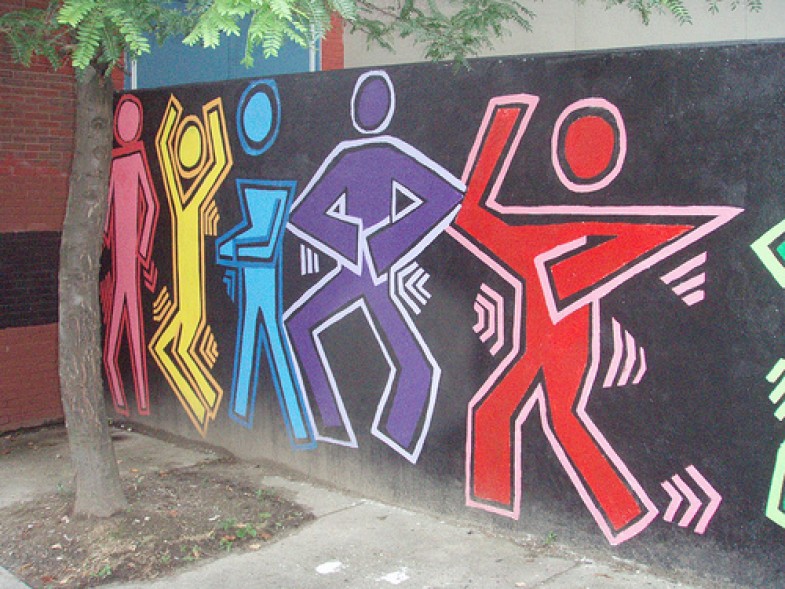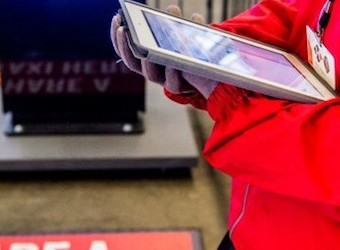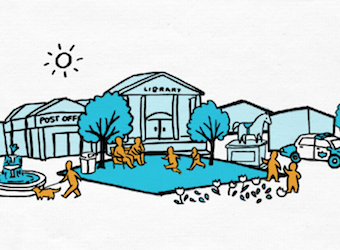As the home of America’s most famous commons—the site of political rallies, community happenings and spontaneous socializing since 1634—Boston made an obvious choice for OTC’s first commons convergence.
More than 120 people gathered at the First Church in Jamaica Plan, Unitarian-Universalist March 4 for the Jamaica Plain Forum—a regular event that brings in speakers to explore current issues and ideas, and which itself qualifies as an exemplary example of the commons. A neighborhood legendary for its high levels of civic engagement (see the community mural pictured here), Jamaica Plain seemed the right spot to launch our commons tour.
The evening was designed as a celebration of the commons in Boston. The stars were Boston-based organizations involved in protecting and expanding what belongs to all of us.
OTC Fellow Chuck Collins, director of the Jamaica Plain Forum , opened the evening with a short presentation about the forum itself, which is held two or three times a month.
OTC Fellow Alexa Bradley presented an introduction to the commons and its practical applications in communities around the world As one example she pointed to OTC’s new project to declare the Great Lakes as a commons in partnership with the Council of Canadians, Native American nations and local environmental and social justice groups. Bradley noted that calling a resource a commons sends a powerful message because it means we will not make trade-offs between ecological responsibility, social equity and participatory governance— they are all intrinsic elements of a commons.
OTC co-director Julie Ristau outlined a strategy everyone can adopt for protecting and promoting the commons. It’s not enough to simply recognize the commons around us, she advised, we need to name it, which lets us “remember it is ours.” The next step is claiming the commons, which is “to stand up, to stand with others and to stand for major social change—to reclaim and protect what belongs to all of us.”
Jay Walljasper, author of the newly published commons field guide All That We Share: A Field Guide to the Commons noted that the cutting of public services happening all across America amounts to wholesale dismantling of our social commons.
“The financial downswing created new pressures to balance state and local government budgets by hacking away at critical services and programs, which we all depend on,” he said, reading from an article in All That We Share. “Transit, public schools, libraries, medical assistance, social services and parks have been on the chopping block in most communities. This, of course, hits middle- and lower-income folks the hardest.
“And the economic decline follows several decades when our common wealth was looted by corporate executives, which began in the 1980s and continues unabated today,” he continued. “Fortunately, this unprecedented theft of the commons sparked a new movement of ‘commoners’ from all walks of life. More than just an activist cause, the commons is becoming a model for thinking differently about how we make decisions, manage resources and think about responsibilities.”
Organizations and organizing efforts in the Boston area shared stories and insights about their diverse efforts to name and claim various aspects of the commons.
The Common Security Club Network Founded in response to the current financial crisis, common security clubs bring neighbors together to explore ways to increase their security through: 1) learning about the causes of the economic and ecological crises; 2) undertaking forms of mutual aid and resource sharing, and 3) identifying social action to improve prospects for everyone.
The Franklin Park Coalition This community group focuses on preserving and revitalizing Franklin Park, an inner city oasis designed by Frederick Law Olmstead that remains a social and natural hub of Boston today. They describe their mission this way: “We want park community members to help care for the park’s special places and have a voice in decisions that impact the park. Most of all, we want Franklin Park to get the attention and resources that this historic landmark and vital community resource deserves!”
A new initiative launched by Cape Cod resident Jan Hively, Make > SHIFT creates a commons for collaborative entrepreneurship. “It’s based on a learning process that shifts attention in this time of job scarcity to the abundance of possibilities for meaningful work that can generate both income and community benefits,” Hively notes. “Meeting eight times over a four-month period, people brainstorm ideas for products and services stemming from current demographic and market and then form teams to research the feasibility of business concepts based on the ideas. The Make>SHIFT Guide will soon be available for download on the On the Commons website.”
Charles River Watershed Association Since 1965, the CRWA has worked to clean up the river and enhance environmental quality throughout the entire Charles watershed by educating and advocating about riverfront parks, scientific watershed management plans and legal protections. One of their programs, the Allston Green Streets Project involves an urban community in reclaiming its connection to the Charles River through the creation of a greenway, park and watershed stewardship activities.
Time Trade Circle This local time bank strengthens informal support systems beyond the cash economy through an organized system people can find and offer services in the currency of the time involved.
A video explored the leadership of Boston Public Library children’s librarian Laura Foner in saving and strengthening neighborhood libraries in the city, and David Weinstein, whose Harbor Connections project instills city kids with a sense of stewardship and civic responsibility toward Boston Harbor and its islands.
Socializing for Justice An innovative effort focused on “putting the SOCIAL back in social justice,” SoJust hosts a lively social networking website, opportunities for skill and knowledge sharing and, most importantly, numerous offline events to build community among people passionate about social change.
The Food Project Connecting urban youth to growing and providing food, is the mission of this organization, which runs five truck farms in the region as well as farmer’s markets, a community supported agriculture program, donations to hunger relief organizations, and a campaign to increase the quality of food at local schools.
“Saulo Arajuo”: http://www.onthecommons.org/open-source-world, board member of the Food Project, also described his work with “Grassroots International”: http://www.grassrootsonline.org/ , a human rights and international development organization that supports community-led sustainable development projects, including projects to introduce “open source” technology in his native Brazil such as improved cisterns for water.
We are scheduling other OTC commons events throughout the year, including Minneapolis-St. Paul (March 29-April 4), Gustavus Adolphus College, St. Peter MN (April 5), Portsmouth, NH & Portland ME (April), Portland, OR (May 7), San Francisco Bay Area (May) and Augsburg College, Minneapolis (Oct 7-8).







